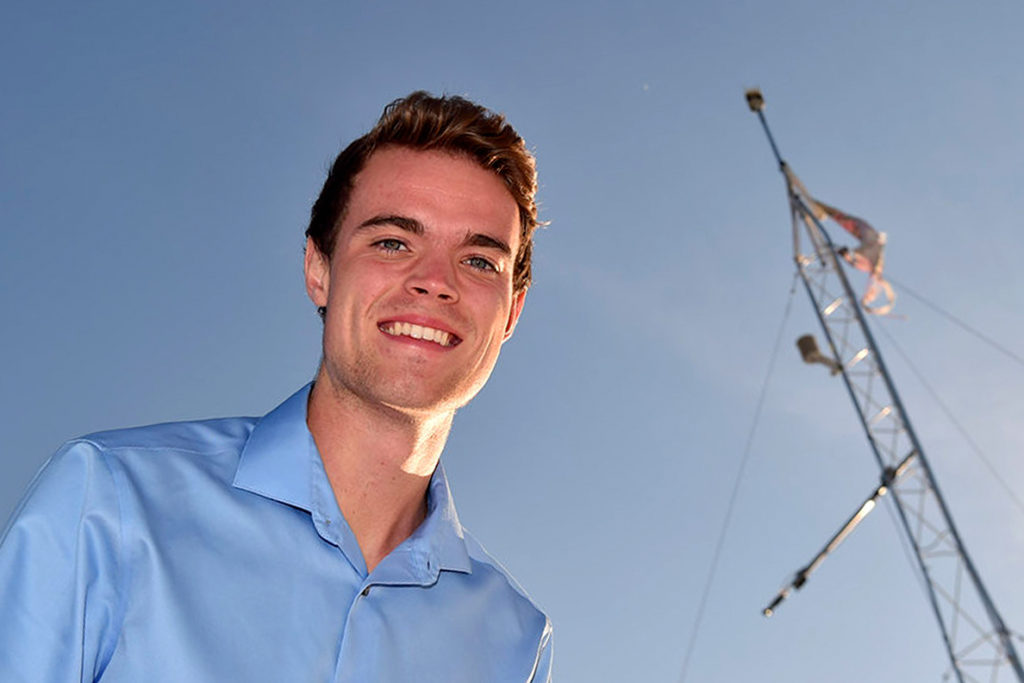Kristian Gubsch doesn’t talk so much about global climate change.
Rather, the mild-mannered and polite chemical engineering and Honors College student uses a different term — “global climate action” — that better conveys the urgency that many people of his generation intuitively understand: The world faces an impending climate crisis that requires immediate action.
Gubsch is one of eight students nationwide who will be a delegate for the American Chemical Society at what may arguably be the world’s most important meeting — the United Nations Framework Convention on Climate Change’s Conference of the Parties (COP). The meeting will be held Dec. 2-13 in Madrid, Spain.
The group, which has met annually since 1995 and includes representatives from every country in the world, is tasked with trying to help nations live up to the Paris Agreement, a world-wide commitment to cut emissions of heat-trapping gasses in order to limit the planet’s warming to 1.5 degrees C. That is the amount of warming that scientists say we need to maintain in order to minimize the risks and effects of climate change. Every nation in the world signed onto the 2015 agreement, although the Trump administration has announced its plan to withdraw in November, 2020.
Gubsch first became concerned about the need for climate action as a high school student in Edgewood, Washington. There, in physics class, he learned that our human love of fossil fuels and the easy energy it provides is warming the planet and promising to wreak havoc on our temperate way of life – causing extreme heat waves, catastrophic forest fires, droughts, flooding, sea level rise, and suffering. He learned that we only have a few years to act to drastically cut what we pump into the air. And, he saw some inspiring and innovative ideas for solutions. He remembers one video, in particular, that showed a scary glimpse of the future with mass extinctions and burning forests.
“This was the potential future of Earth,” he said. “I decided I wanted to dedicate my career to not allowing that to happen.”

With a desire to make a difference, he chose to study chemical engineering because he believes it offers the best way to understand and solve climate change.
“The atmosphere and climate are based on chemistry, and I have a strong desire to solve problems through engineering,” he said.
Since arriving at WSU, he has continued his singular pursuit. He has participated in undergraduate research projects to build air quality sensors and to develop possible products from carbon dioxide capture. He was the university’s first-ever recipient of the National Oceanic and Atmospheric Administration (NOAA) Ernest F. Hollings Undergraduate Scholarship, which allowed him to work as a summer researcher at the National Institute of Standards and Technology. There he worked on a project to understand the impact of climate change and an increasingly acidic ocean on coral reefs. He also has received a prestigious Goldwater Scholarship.
When a friend told him the possibility of serving as a delegate at COP 25, he jumped at the chance. Leaving the U.S. for the first time in December, he’s looking forward to gaining a global perspective on the climate challenge. And, he’s hoping to see and encourage conference delegates to commit to a higher level of climate action to stave off ever worsening predictions for the future.
“The Paris Agreement isn’t enough,” he said. “More commitment on the policy side would be a great start. The effort has to be multi-faceted if we have a chance of addressing it.”
As delegates for the American Chemical Society, Gusch and his fellow students will attend sessions, blog their observations, and interview scientists, policy makers, and national leaders in the field. As a delegate, he will be sharing his experience as widely as possible.
“This is an incredible opportunity,” he said. “I’ll be documenting everything I learn. The whole point is to educate the community through my posts and interviews.”







